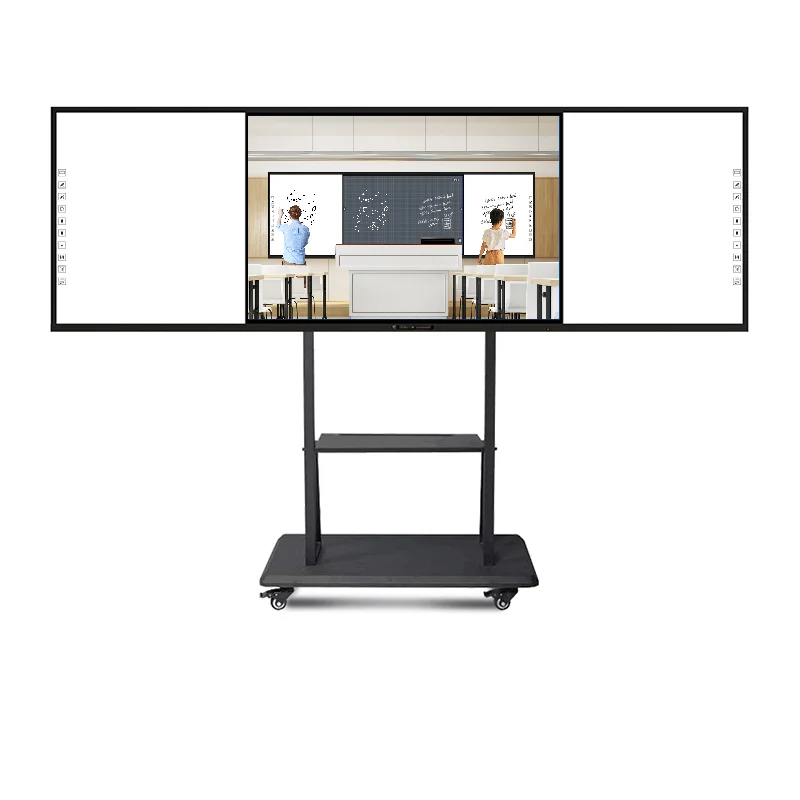- This topic is empty.
-
AuthorPosts
-
2024-12-04 at 3:40 pm #2635
In recent years, advancements in educational technology have transformed traditional classrooms into dynamic learning environments. In this blog post, Orgscreen, a high quality interactive touch screen manufacturer, will share how interactive touch screen blackboard for teaching are changing the way education is taught, creating an immersive and engaging classroom experience that promotes deeper learning and collaboration.
What is an Interactive Touch Screen Blackboard?
An interactive touch screen blackboard is a digital display that combines the familiarity of a blackboard with the functionality of modern technology. These devices are equipped with touch-sensitive screens that allow teachers and students to interact directly with the display using a finger or stylus. They often include features such as handwriting recognition, internet connectivity, multimedia integration, and screen sharing capabilities, making them versatile tools for 21st-century education.
Unlike traditional blackboards that require chalk or whiteboards that rely on markers, interactive touch screen blackboards offer a cleaner, more sustainable solution. They eliminate the mess of chalk dust and the hassle of replacing markers while significantly reducing paper waste by digitizing notes and lessons.

The Impact of Interactive Touch Screen Blackboards on Teaching
Interactive touch screen blackboards have redefined how teachers deliver lessons and students absorb information. Below are some key ways in which these devices are enhancing teaching and learning experiences.
1. Engaging Visual Learning
One of the most notable benefits of interactive touch screen blackboards is their ability to incorporate vibrant visuals into lessons. Teachers can display high-resolution images, videos, and animations that make complex concepts easier to understand. For example, a biology teacher can use 3D animations to demonstrate how the human heart pumps blood, providing students with a more vivid understanding than static diagrams could.
2. Interactive Lessons
Traditional teaching methods often involve one-way communication, with the teacher delivering a lecture and students passively listening. Interactive touch screen blackboards, however, promote active participation. Teachers can use interactive features like drawing tools, quizzes, and games to make lessons more engaging. For instance, in a geography class, students can drag and drop country names onto a digital map, turning a simple exercise into a hands-on learning experience.
3. Seamless Integration of Multimedia
The modern classroom thrives on multimedia content, and interactive touch screen blackboards excel in this area. Teachers can easily integrate videos, audio clips, and live web resources into their lessons. A history teacher, for example, can play archival footage of significant events, allowing students to experience history as it happened.
4. Real-Time Collaboration
Interactive touch screen blackboards facilitate real-time collaboration between teachers and students. Many devices allow multiple users to interact with the screen simultaneously, encouraging group work and problem-solving. Additionally, these blackboards can connect to students' devices, enabling them to contribute to lessons from their seats.
5. Remote Learning Capabilities
In the era of hybrid learning, interactive touch screen blackboards have proven invaluable. Many models come with screen-sharing features that allow teachers to broadcast lessons to students at home. Conversely, remote students can share their work with the classroom, ensuring a seamless learning experience regardless of location.

Benefits for Teachers
For teachers, the interactive touch screen blackboard is a game-changer. It streamlines lesson planning and execution, saving valuable time and effort. Teachers can prepare lessons in advance, store them digitally, and retrieve them with just a few taps. Furthermore, they can annotate directly on the screen, highlight key points, and save their notes for future reference.
Additionally, the technology helps cater to diverse learning styles. Visual learners benefit from multimedia content, kinesthetic learners thrive with hands-on interaction, and auditory learners can engage through integrated audio features. This versatility ensures that no student is left behind.
Benefits for Students
Students, too, reap significant benefits from this technology. The interactive nature of the blackboard keeps them engaged and motivated, making learning more enjoyable. Moreover, the ability to revisit saved lessons helps students review and reinforce their understanding outside the classroom.
Interactive touch screen blackboards also encourage critical thinking and creativity. By allowing students to interact with the content, these tools enable them to explore ideas, solve problems, and express their creativity in ways traditional tools cannot.
Conclusion
The interactive touch screen blackboard for teaching represents a significant step forward in educational technology. By merging the best aspects of traditional blackboards with cutting-edge digital capabilities, it has the power to create a more engaging, inclusive, and effective learning environment.
As schools embrace this transformative tool, teachers and students alike will benefit from a richer, more interactive classroom experience. Whether it's a young child learning basic math or a high school student tackling advanced physics, the interactive touch screen blackboard ensures that learning is not only effective but also enjoyable. In a world that is increasingly digital, this technology is shaping the future of education one classroom at a time.
https://www.orgscreen.com/Interactive-Touch-Screen-Blackboard-for-Teaching.html
http://www.orgscreen.com
Orgscreen -
AuthorPosts
- You must be logged in to reply to this topic.

